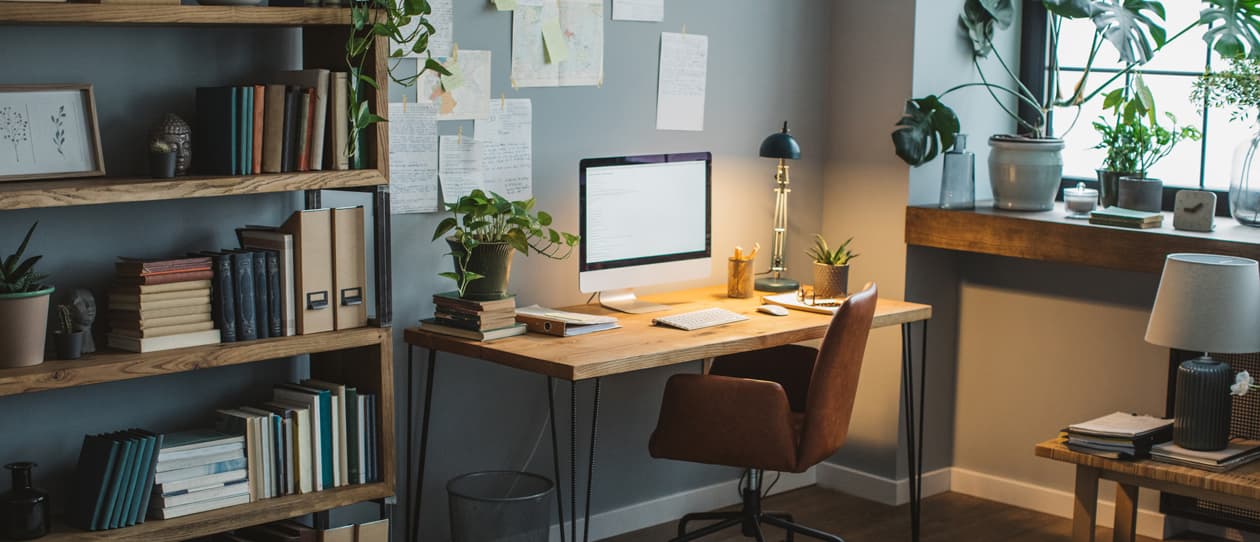
- Health hub/
- Stress relief & sleep support/
- Is it good to sleep and work in the same room?


These days, with the squeeze on rental properties and challenges of home affordability, a compromise of spaces in the home has been required. In addition, there has been a shift to more remote working, which includes the use of home spaces for such work.
Increasingly, bedrooms are becoming more than just a space for sleep. According to a recent study, we are using our traditional sleep spaces for various purposes and they are becoming more multifunctional.
The UNSW Sydney study found approximately 40 per cent of respondents used their bedroom as a living area, while 61 per cent said they preferred to use it just for sleep.
Benefits of working in the bedroom
As this study shows, working in the bedroom can often stem from not having an extra workspace in the house if needed.
Where no other space is available in the home, working from the bedroom provides the opportunity for someone to work without having to commute. They can still work from home, away from common areas in the home where it’s not quiet enough, for instance, where other people may be watching TV.
While 90 per cent of study respondents used their bedroom at least some of the time for sleeping, the rest either did not have a bedroom for sleeping or used it for a totally different purpose.
The younger age group spent more time in their bedrooms than other age groups, while they were also more likely to use the bedroom space for activities other than sleep.
Students reported using the bedroom more to work from – even more so than respondents who worked from home.
Those living in share housing were also more likely to use their bedroom as a work area, while those living in a studio apartment were more likely to use their bedroom as a shared space.
Dr Demet Dincer, lead author of the study from UNSW Arts, Design & Architecture, says, “Almost half of our respondents said their bedroom was their living space, even though most don’t prefer that. However, we can’t change the reality that our domestic spaces, including the bedroom space, are shrinking and must accommodate more functions”.
Disadvantages of working in the bedroom
The main downsides of working in the bedroom relate to the sleep environment it creates. The sleep environment can significantly influence sleep quality.
- No boundaries between work and home: Working from the same room as your bed can have negative effects on your sleep, as it can create the means for work to flow over into your home life.
- Poor sleep environment: Having a computer and other work related tools in the bedroom creates a sleep environment that can be distracting and reminds you of work when you should be sleeping, making it hard for you to disconnect from work.
- Negative impact on productivity: Working from your bedroom means there can be distractions and items of leisure there, which can take your focus away from work.
If you need to work in your sleep space
Unfortunately, in today’s environment, some people may have little choice but to work in their sleeping environment. If this is the case, there are steps you can take to ensure your space is one where you can work productively, but that is also as conducive to sleeping as possible.
- Create separation between your work space and sleep space: This could mean rearranging some furniture around to achieve this or using a room divider if possible. For example, The Sleep Foundation suggests to consider repurposing a closet shelf to make a standing desk.
- Make the set up ergonomic: Just because it’s your bedroom and not the workplace, it doesn’t mean it can’t be ergonomic. The Australian Chiropractors Association has a handy ergonomic checklist as a guide.
- Adjust the chair and computer monitor to a safe height and invest in an ergonomic keyboard, mouse pad and chair to help reduce any body strain, as this can lead to poor sleep.
- The blue light that computers emit can interfere with your ability to fall asleep, so it’s best to turn off the screen at night and at least one hour before bed when you are starting to wind down.
- Keep the space neat and tidy: This goes for your whole bedroom, which now includes your desk. Clutter can be extremely distracting to sleep, as seeing a mess while you are trying to sleep may induce stress and worry.
- Don’t do work in bed: The bed is meant to be associated with relaxation and sleep. If you take your laptop to bed, you may associate the bed with work, which won’t help when you are trying to sleep.
- Follow a wind down ritual: When it comes to bedtime, try to follow a consistent routine so that it becomes a natural habit each night, making it easier for you to transition to sleep. For example, you could start by throwing a blanket over the desk area so that nothing work related can be seen. Then you could start diffusing some essential oils or light a candle, followed by a warm bath, tea, reading, meditation and stretching before heading to bed.
REFERENCES
https://www.sleepfoundation.org/sleep-hygiene/remote-work-and-sleep




